Bernd Richard Deutsch: Klimt-inspired Phantasma returns to Austria

Bernd Richard Deutsch’s orchestral work Phantasma is rapidly becoming his most internationally travelled score. Its Austrian premiere at the Musikprotokoll in Graz represents a homecoming both for composer and the artist Gustav Klimt who inspired it.
Now in his 40s, Bernd Richard Deutsch is established as the leading Austrian composer of his generation, with an international calendar of performances by prestigious orchestras. His 13-minute orchestral score Phantasma has been travelling widely since its premiere in 2022, visiting Germany, the Netherlands and the UK. Further outings are scheduled in 2025 in Prague, Trondheim and Amsterdam and its US premiere is planned for a future season in Cleveland, where Deutsch was Composer Fellow with the Cleveland Orchestra between 2018 and 2020.
This autumn brings Phantasma’s first performance in the composer’s native Austria, with the Radio Symphony Orchestra Vienna at the ORF Musikprotokoll in Graz, conducted by Roland Kluttig. The event is part of the annual steirischerherbst festival which celebrates interdisciplinary arts, with Deutsch’s work selected for its joining of music and art. Phantasma is an orchestral response to Gustav Klimt’s extraordinary Beethoven Frieze, on display in the Secession Building in Vienna.
> Visit the Musikprotokoll website
Deutsch’s composition adds a further interdisciplinary layer to those already embedded in Klimt’s frieze, which drew upon Wagner’s 1846 programme note for Beethoven’s Symphony No.9. Deutsch describes how the Beethoven Frieze, “one of the most important works of his ‘golden’ period, is representative of Klimt’s philosophy of art, and it contains a number of motifs that appear frequently in his works. Thus, for example, the hovering female figures in the Water Serpents, which exist in two versions, and the motif of the kiss, which Klimt depicted several times, appears here, too.”
Deutsch’s first movement, headed The yearning for happiness, is hovering and lyrical, building to a passionate outburst. The central movement, The hostile forces, is a dramatic depiction of the mythical monsters painted by Klimt, and the final movement, …into the ideal realm, develops an ecstatic-eruptive character before reprising the outburst and returning to the dreamlike mood of the opening.
Central to the work is a rhythmic motive which refers to the knocking signal that was the special means of entry to Klimt’s atelier. As Deutsch explains, “everyone has probably experienced that shortly before waking up in the morning, sounds from the surroundings can become part of a dream. In analogy to this phenomenon, the piece ultimately shows itself, through the recurring knocking motif at the end, to be a dream vision or illusion – a Phantasma.”
Works composed by Bernd Richard Deutsch over the past decade include a Cello Concerto (2016-19) written for Johannes Moser, Phaenomena (2018) available in twin versions for either sheng or accordion and orchestra, and Intensity (2019-20), premiered by the Cleveland Orchestra under Franz Welser-Möst. Deutsch’s organ concerto Okeanos (2014-15), performed to date in Vienna, Cleveland, Stavanger, Stockholm and Berlin, has received two recordings: on the Cleveland Orchestra’s own label and on Berlin Classics.
His latest work is a large-scale score for choir and orchestra, Urworte, setting texts by Goethe, co-commissioned by the Cleveland Orchestra and the NDR Elbphilharmonie. The first two parts of the 50-minute score will be unveiled in Cleveland on 21 November conducted by Franz Welser-Möst, with the first complete performance scheduled on 7 February as part of the Elbphilharmonie’s Visions Festival in Hamburg, under the baton of Alan Gilbert.
